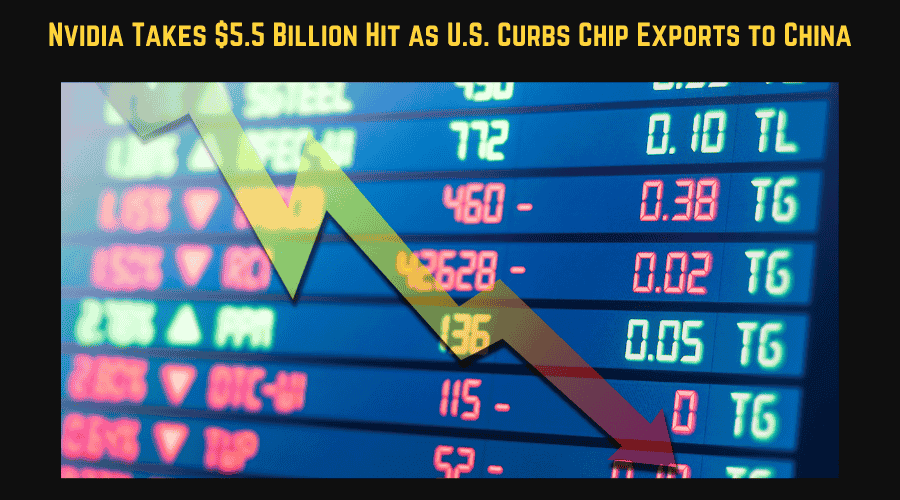Nvidia Takes $5.5 Billion Hit as U.S. Curbs Chip Exports to China
Nvidia announced Tuesday that it will record $5.5 billion in charges due to new U.S. export restrictions on its H20 artificial intelligence chip, a product central to its presence in the Chinese market.
The H20 chip, tailored for China’s AI industry, was designed by Nvidia to comply with prior U.S. restrictions aimed at preventing the transfer of cutting-edge AI technology to China.
However, fresh regulations from the U.S. Commerce Department now require export licenses for H20 and comparable chips like AMD’s MI308. Nvidia’s stock dropped around 6% in after-hours trading, while AMD’s fell by 7%.
Related story: Nvidia Commits to U.S. AI Chip Production Amid Political and Economic Shifts
National Security at the Forefront of Chip Policy
A spokesperson for the U.S. Commerce Department stated, “The Commerce Department is committed to acting on the President’s directive to safeguard our national and economic security.”
The agency continues to enforce measures to limit the potential use of advanced chips in Chinese supercomputing efforts.
AMD did not respond to media inquiries. Meanwhile, Nvidia’s H20 chip, though not as powerful in AI model training as those sold elsewhere, is strong in the inference phase—where models generate responses for users.
Inference has quickly become a dominant segment of the AI hardware market, and Nvidia CEO Jensen Huang has maintained confidence in the company’s leadership in this area.
Nonetheless, officials raised concerns that the H20’s high-speed connectivity to memory and compute components makes it suitable for supercomputing—a capability the U.S. has sought to restrict in China since 2022.
According to Nvidia, U.S. authorities informed the company on April 9 that the H20 would need an export license, and by April 14, the restriction was made indefinite.
The Institute for Progress, a Washington, D.C.-based think tank, supported the move, warning of potential misuse:
“At least one of the buyers, Tencent, has already installed H20s in a facility used to train a large model, very likely in breach of existing controls… DeepSeek’s supercomputer used to train their V3 model is also likely in breach of the same restrictions.”
Nvidia, while declining further comment, confirmed that the $5.5 billion in charges covers H20-related inventory, purchase obligations, and associated reserves.
This update follows Nvidia’s Monday announcement that it plans to partner with TSMC and others to construct AI server infrastructure worth up to $500 billion in the U.S. over the next four years—an initiative aligned with the Trump administration’s efforts to bolster domestic tech production.
Learn more: Best Cybersecurity Certification for IT Professionals

